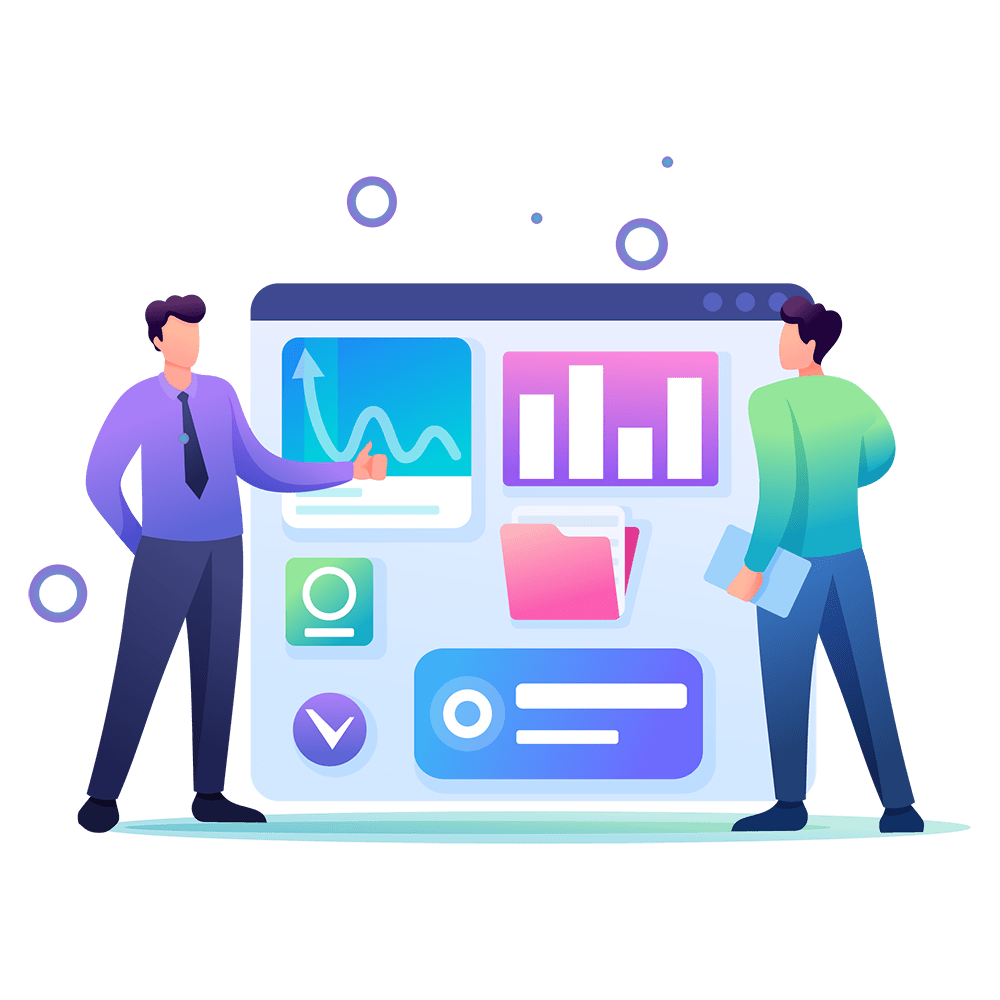SEO Services for Business Growth: Boost Your Market Visibility and Profitability
Gain a Competitive Edge in Local Markets with Strategic SEO


Elevate Your Business with Expert SEO Services
In the digital age, visibility is currency. As an SEO Agency with a proven track record of scaling traffic for clients across Canada our SEO services ensure your business isn’t just visible, but a prominent contender in the digital marketplace. At Loop Marketing, we understand that good SEO is critical for business growth, profitability, and long-term success.
Why Choose Loop for your SEO Services?
We streamline your website not only to climb the ranks in search engine results but to resonate with your target audience truly.
Our strategy is twofold: we enhance your site’s underlying framework to meet search engines’ technical benchmarks and craft compelling content that speaks directly to your prospective customers’ needs.
With our sophisticated approach, we navigate the complex factors influencing search rankings—from site authority and security to backlinks and content relevance. No aspect of your online presence is left to chance. We view SEO through the lens of your customer’s journey, ensuring every stage of their search leads straight to your services.
Invest in SEO services that do more than attract clicks—they build connections and drive conversions. Let us help you turn your website into your most powerful business asset.
Why Does SEO Matter For Your Business?
Trust
People tend to trust organic search results even more than ads (but having both take up space on the SERP really helps!)
Sustainability
Once you have ranked for your targeted keywords, it can be a source of constant traffic - and new prospects - to your website.
Cost
Remember, ranking organically is free, though it takes some work to get there.
Our SEO Services are broken up into three major categories:




On-Site Optimization
The process of optimizing the content on your web pages to rank higher on the search engine results page. This can be a time-consuming task, requiring lots of monitoring maintenance. Loop’s SEO Specialists can take care of these issues quickly and efficiently, so you don’t have to.
Our On-Site SEO Mix
To achieve positive results, we use a wide array of strategies, tools, and techniques to improve and build the strength of your On-Site SEO content. Our goal is to improve your site’s ranking, and attract free organic traffic. These tools and techniques include but not limited to:
- Title Tag Optimization
- URL Strategy
- Content Strategy
- Meta Description Optimization
- HTML & CSS Optimization
Off-Site SEO
Off-site SEO leverages other channels and actions on the internet that we can use to drive your search rankings up. At Loop, we understand that utilizing these channels can give you a competitive advantage, and we stay on top of industry updates and new strategies. We leverage a wide range of tools and techniques to ensure optimum results. These include:
Our Off-Site SEO Mix
- Press Releases
- Social Media Engagement
- Shareable Content
- Newsletters
- Link Building








Local SEO
Even if your business only serves the local area, it is becoming increasingly important to integrate your physical location with your online one. Search engines also account for geographical locations of web searches, and it is vital that you are taking advantage of this. This can be done in a variety of ways, including an up-to-date GoogleMyBusiness account, making entries into local directories, managing your reviews, and properly incorporating your address and location content into your website. To ensure your business gets the local attention it needs, Loop is there to help.
Our Local SEO Mix
- Google My Busines
- Local Citations
- Map Pack Curation
- Website Integration
Let's see what you're working with
Tell us a bit about your business, and we will give you a few tips, tricks, and recommendations on the house.
Our SEO Process
Learn & Understand
First, we evaluate your business’ needs, target audience, and preferences.
Analyze Your Competition
We then analyze what techniques high ranking competitors in your niche are using.
Site Audit & Strategy
Next, we do an extensive site audit of your current website, and create a strategy that will allow you to outrank your competitors.
Implementation
We implement the strategy, and work with you to make any adjustments during execution.
Track & Improve
Finally, we monitor and update as needed (things always change) together with you.


Full Feature List
- Loading Speed Optimizations
- Mobile-Friendly Optimization
- Local Search Optimization (Google Map & Business Profiles)
- Social Network Optimization
- Duplicate Content Scanning & Removal
- Website Restructuring & Navigation Management
- Optimize Page Titles & Descriptions
- Image Optimization & Alt Text Optimization
- Redirect & Broken Link Management
- Keyword Research
- Internal Page Linking
- Backlink Creation
- Anchor Text Strategy & Management
- URL Keyword Management & Strategy
- Unique Search Engine Headlines & Content Development
- Content Curation & Management
- Recycled & Re-Purpose Content
Frequently Asked Questions
The decision between managing SEO in-house or hiring an agency depends on your expertise, resources, and goals. In-house teams provide control and immediate attention, while agencies offer specialized knowledge, broader skill sets, and ongoing support. Assess your capacity, budget, and long-term objectives to determine the best fit.
Was this FAQ Useful?
SEO services employ various strategies to enhance your website’s ranking. This includes optimizing on-page elements like meta tags, headings, and content quality, ensuring your site is mobile-friendly, improving site speed, acquiring quality backlinks, and conducting keyword research to target relevant search terms. These efforts collectively signal to search engines that your site is valuable and relevant to users, thereby improving its ranking position.
Was this FAQ Useful?
Keyword research for SEO is a critical process that involves identifying the words and phrases that potential customers use when searching for products or services similar to yours in search engines like Google. This foundational step in SEO helps to ensure that your website content aligns with the terms that your target audience is actually using, thereby increasing the likelihood that your site will appear in search engine results when these terms are queried.
Here’s a breakdown of what keyword research typically involves:
- Identifying Relevant Keywords: The first step is to brainstorm and gather a list of potential keywords that reflect the services, products, or information your website offers. This can include generic terms, more specific phrases, and questions that potential customers might use.
- Using Keyword Research Tools: Tools like Google Keyword Planner, SEMrush, Ahrefs, or Moz Keyword Explorer are used to expand this list by finding related keywords, variations, and phrases. These tools can also provide data on search volume, competition level, and the search intent behind the keywords.
- Analyzing Search Volume and Competition: It’s important to consider how often each keyword is searched (search volume) and how difficult it would be to rank for each keyword (competition). Higher search volumes mean more potential traffic, but higher competition might make it harder to rank well.
- Understanding Search Intent: Keywords can have different user intents behind them, such as informational (looking for information), navigational (looking for a specific website), transactional (ready to buy), or commercial (comparing products or services). Understanding the intent helps in tailoring content to meet the needs of users at different stages of the customer journey.
- Selecting Target Keywords: Based on relevance, search volume, competition, and search intent, you select the most appropriate keywords to target. These chosen keywords will guide content creation, website structure, and overall SEO strategy.
- Integration into Content: Finally, the selected keywords are naturally incorporated into your website’s content, including web pages, blog posts, titles, meta descriptions, and URLs, among other elements. This integration helps search engines understand your site’s relevance to those keywords, improving your chances of ranking higher in search results.
Effective keyword research not only improves your visibility in search engines but also enhances the user experience by ensuring that your content meets the needs and interests of your audience.
Was this FAQ Useful?
A Local citation provides a way for consumers to discover local businesses. Online sites like Yelp and Google Maps allow users the opportunity of adding information about your business including address, phone number as well any reviews from other customers who have been satisfied with their services or products they sold at this location–giving them a succinct way to learn about high-level business information. Local citations are extremely important in marketing because it creates more awareness for the business as well give a new channel to flow through to your website and business.
Was this FAQ Useful?
Search Engine Optimization (SEO) services focus on optimizing your online presence to improve your website’s visibility on search engines like Google. This involves enhancing various elements such as content, keywords, site structure, and user experience. The benefits are immense—increased organic traffic, better visibility for relevant searches, heightened brand credibility, and potentially higher conversion rates. By optimizing your website, you attract more qualified leads actively seeking your products or services, leading to enhanced business growth and profitability.
Was this FAQ Useful?
What is Local SEO?
Local SEO (Search Engine Optimization) is a targeted approach designed to increase the visibility of a business in local search results on Google and other search engines. It’s an essential strategy for any business that serves a specific geographical area, as it helps to attract more customers from that locale to their online presence or physical location.
Why is Local SEO Important for Your Edmonton Business?
For businesses in Edmonton, local SEO is vital because it ensures that your company appears in search results when potential customers in your area are looking for related services. By focusing on “local SEO Edmonton” and “Edmonton local SEO services,” businesses can effectively compete with other local entities, making it easier for nearby customers to find and choose their services over others.
How Does Local SEO Work?
Local SEO involves several key tactics that tailor your business’s digital footprint to the Edmonton area:
- Optimizing Your Website: Including local keywords such as “Edmonton SEO services” and “local SEO service Edmonton” in your website’s content, meta descriptions, and titles to improve relevance in local search queries.
- Google My Business (GMB): Setting up and optimizing a GMB profile to enhance visibility in Google’s local search results and Google Maps. This is crucial for “Edmonton local SEO” as it helps ensure your business details are correct and comprehensive.
- Local Citations: Ensuring your business is listed accurately on local directories and citation sites, which helps improve your local search visibility.
- Building Local Links: Acquiring backlinks from well-regarded local websites like chambers of commerce or local business groups, which reinforces your local presence.
The Benefits of Implementing Local SEO for Edmonton Businesses
Implementing local SEO can significantly boost your local online visibility, helping to drive more traffic—both online and in-person—to your Edmonton business. Effective local SEO strategies not only improve your rankings in search results but also enhance user engagement by providing potential customers with accurate and relevant information about your local business.
For a deeper dive into how local SEO can transform your business and for more tailored strategies, visit our detailed service page on SEO Services and learn how our expertise at Loop Marketing, a renowned Edmonton SEO agency, can propel your business to new heights.
Was this FAQ Useful?
Creating and optimizing content for Search Engine Optimization (SEO) involves a strategic approach focused on producing relevant, high-quality content that aligns with the interests and search behaviours of your target audience while also adhering to search engine standards. Here’s a step-by-step guide to creating and optimizing content for SEO:
1. Understand Your Audience
- Identify your target audience: Understand who they are, what they care about, and their challenges.
- Search Intent: Determine what your audience is looking for when they search for keywords related to your business. Identify whether their intent is informational, navigational, transactional, or commercial.
2. Keyword Research
- Find relevant keywords: Use tools like Google Keyword Planner, Ahrefs, or SEMrush to find keywords that your target audience is searching for.
- Choose keywords wisely: Select keywords based on their search volume, difficulty, and relevance to your content. Consider long-tail keywords, which are less competitive and more specific.
3. Create Quality Content
- Content type: Decide on the type of content that best suits your SEO goals and audience needs—blogs, articles, how-tos, guides, videos, etc.
- Value and relevance: Ensure the content is useful, informative, and engaging. It should answer questions or solve problems related to the keywords.
- Content structure: Use headings (H1, H2, H3) to structure your content. This helps both users and search engines understand the different sections of your content.
4. Optimize for Keywords
- Naturally integrate keywords: Include your target keywords in the title, headings, introductory sentence, concluding paragraph, and throughout the content naturally.
- Keyword density: Maintain a reasonable keyword density that feels natural and not forced. Overusing keywords can lead to penalties for keyword stuffing.
5. Optimize Technical Elements
- Meta titles and descriptions: Write compelling meta titles and descriptions with targeted keywords. These appear in search results and can influence click-through rates.
- URL structure: Ensure URLs are short, readable, and include a keyword if possible.
- Alt tags for images: Use alt tags to describe images, incorporating keywords when appropriate. This helps search engines understand the images and can also improve accessibility.
6. Use Internal and External Links
- Internal linking: Link to other pages within your website to help search engines crawl your site more effectively and keep users engaged.
- External linking: Include links to reputable sites to provide additional value and increase the credibility of your content.
7. Content Freshness
- Update regularly: Keep your content up-to-date by revisiting and updating older posts. This shows search engines that your content remains relevant.
8. Mobile Optimization
- Responsive design: Ensure your content looks good and functions well on mobile devices, as this can significantly affect your search rankings.
9. Use Analytics to Measure and Improve
- Monitor performance: Use tools like Google Analytics to track how your content is performing. Look at metrics like page views, average time on page, and bounce rate.
- Adjust based on data: Use the data to understand what works and what doesn’t, and adjust your content strategy accordingly.
Creating and optimizing content for SEO is about balancing the quality of the information you provide with the optimization techniques that help search engines understand and value your content. This balance will help you rank higher in search results, attract more traffic, and achieve your business goals.
Was this FAQ Useful?
Hiring a professional SEO agency is crucial because SEO is a complex and continuously evolving field. An agency brings expertise, experience, and dedicated resources to develop and execute effective strategies. They stay abreast of algorithm changes, have access to specialized tools, and possess the know-how to navigate the nuances of SEO, ensuring your business stays competitive in the online landscape.
Was this FAQ Useful?
SEO agencies utilize specialized tools and resources to make their strategies work smoothly. They rely on tools like SEMrush, Ahrefs, and Google Keyword Planner to find the best words and phrases people use when searching online. These help in understanding user behaviour and preferences. Platforms like Google Analytics and Google Search Console help in analyzing data to see how well the strategies are working. Link-building tools are used to connect with other websites and track these connections. For managing website content, agencies often use systems like WordPress or Drupal. Technical SEO tools such as Screaming Frog or Moz help in checking the website’s health and fixing any issues that might affect its performance. All these tools play a crucial role in finding the right keywords, evaluating performance, creating content, and making sure the website is optimized to appear higher in search results.
Was this FAQ Useful?
When you’re thinking about SEO services, watch out for these common blunders. Firstly, picking based solely on price can backfire; good SEO often needs a solid investment, so don’t sacrifice expertise for a cheaper deal. Secondly, expecting instant results is a no-go; SEO takes time, so having unrealistic hopes might lead to disappointment. Thirdly, don’t overlook the technical side of things like site speed and mobile optimization – they’re crucial for good performance. Then, there’s content quality; just focusing on keywords without great content can hurt your strategy. Lastly, using shady tactics (called black-hat techniques) might seem tempting but could land you in trouble with search engines. Steering clear of these pitfalls ensures your SEO plan works better and lasts longer.
Was this FAQ Useful?
Technical SEO refers to the optimization of the infrastructure and backend aspects of a website to improve its readability by search engines and enhance its ranking in search engine results pages (SERPs). This branch of SEO focuses on optimizing the technical elements of a website rather than the content or the external linking strategies. The goal is to ensure that search engines can crawl, index, and interpret the site effectively and efficiently.
Here are the key components of Technical SEO:
- Website Speed: Ensuring that the website loads quickly on all devices is crucial, as speed is a known ranking factor for Google. Optimizations might include compressing images, leveraging browser caching, and improving server response times.
- Mobile Optimization: With mobile-first indexing, Google predominantly uses the mobile version of the content for indexing and ranking. A mobile-friendly website is essential, ensuring it looks good and functions well on mobile devices.
- Secure Sockets Layer (SSL): SSL is a security technology that creates an encrypted link between a web server and a browser. Websites with HTTPS are prioritized by search engines because they provide a secure connection.
- Crawlability: Search engines use bots to crawl websites and index their content. Ensuring that a website can be easily crawled involves managing your robots.txt files to guide search engine bots, using sitemaps to list all your pages, and checking for crawl errors in tools like Google Search Console.
- Indexing: After crawling the content, search engines index it. Technical SEO ensures that the most important resources of the website are indexed and that unwanted pages (like duplicate content) are excluded through the use of ‘noindex’ tags.
- Canonical URLs: Used to prevent duplicate content issues by specifying the “canonical” or “preferred” version of a web page as part of your meta tags. This helps search engines understand which pages are duplicates and which is the primary version to be indexed.
- Structured Data: Implementing structured data (or schema markup) helps search engines understand the content of your website and provide more informative results to users, such as rich snippets in search results which can improve click-through rates.
- Site Architecture: A well-organized site structure helps users and search engine bots navigate your site more effectively. It involves logical hierarchies for information, proper use of categories, and ensuring each page is no more than a few clicks away from the homepage.
- 404 and Redirection: Managing 404 error pages and redirecting traffic from old pages to relevant new pages is important to keep the user experience positive and maintain link equity.
Technical SEO is an ongoing process that requires regular audits and adjustments to ensure a website meets the latest standards set by search engines and provides an excellent user experience. By optimizing these technical aspects, a website can improve its overall search visibility and ranking, thus attracting more organic traffic.
Was this FAQ Useful?
An SEO agency conducts competitor analysis by evaluating competitors’ websites, content strategies, keywords, backlinks, and overall online presence. They use tools to identify competitors, assess their keyword rankings, analyze content performance, and understand their link-building strategies. This analysis helps identify opportunities and gaps to develop a more effective SEO strategy.
Was this FAQ Useful?
If your SEO effort isn’t performing well, start by auditing your website for technical issues, reassessing keyword targeting, evaluating content quality, and reviewing your backlink profile. Check for penalties, mobile-friendliness, page load speed, and user experience issues. Adjust your strategy based on data, experiment with different tactics, and consider seeking expert advice if needed.
Was this FAQ Useful?
Absolutely! SEO can be done by anyone. It’s not rocket science. It just takes time, energy, and expertise. We love when clients want to support their Organic Strategy. This can involve writing quality content, researching competitors, doing videos etc. There are many different categories with the term “SEO”. If you’d like to learn about all the areas in that you could support your website’s organic rank, let us know.
Was this FAQ Useful?
Keyword research is the backbone of SEO, aiming to identify the terms and phrases users input into search engines. It involves understanding user intent, search volume, and competition for specific keywords relevant to your business. Tools like Google Keyword Planner, SEMrush, or Ahrefs help identify these keywords. The goal is to target terms your audience uses most frequently but are not overly competitive.
Keyword research involves exploring long-tail keywords (more specific, longer phrases), considering related topics, and analyzing competitors’ strategies. It’s crucial to strike a balance between high search volume and relevancy to your content or services.
Was this FAQ Useful?
Measuring the success of an SEO campaign involves tracking various metrics such as organic traffic, keyword rankings, conversion rates, bounce rates, and backlink quality. Utilizing tools like Google Analytics, Google Search Console, and third-party SEO platforms helps monitor these metrics. Additionally, setting clear goals and KPIs (Key Performance Indicators) before the campaign begins allows for a more accurate assessment of its effectiveness.
Was this FAQ Useful?
You can still make SEO work well, even if you don’t have a lot to spend: Firstly, think about using longer and more specific keywords. They’re not as competitive, so it’s easier to rank for them without spending much. Secondly, make your content really good. When people like it, they naturally share it or link to it, which helps your SEO without needing a big budget. You can also learn some SEO basics yourself. There are lots of resources online that can help you do some of the work without hiring someone. If you’re a local business, focus on local SEO. It’s often cheaper and can help you target the people closest to you. And don’t forget about free or cheap tools! There are tools out there that can help you figure out which keywords to use, see how your website is doing, and make your content better. So, by planning things out smartly and using what’s available, you can still make SEO work for you even if you don’t have much money to spare.
Was this FAQ Useful?
Local SEO (Search Engine Optimization) is a critical strategy for businesses aiming to capture the attention of customers within their geographic location. It involves several key components and tactics that work together to enhance a business’s visibility in local search results on platforms like Google.
Key Components of Local SEO
- Google My Business (GMB) Optimization:
- What It Is: A free tool that allows businesses to manage how they appear in Google Maps and Google search results.
- Why It Matters: Properly setting up and maintaining your GMB profile is crucial for local SEO because it affects your business’s visibility in local searches and Google Maps. Accurate and detailed GMB listings can improve your chances of appearing in Google’s Local Pack, the top results shown for local search queries.
- Learn more about optimizing your GMB profile here.
- Keyword Optimization:
- What It Is: Incorporating keywords that are relevant to local consumers, such as “local SEO services Edmonton” or “SEO agency Edmonton”.
- Why It Matters: Using these keywords strategically in your website’s content helps signal to search engines that your business is targeting a specific local market. This includes placing local keywords in your titles, meta descriptions, headers, and body content.
- Citations and Local Listings:
- What It Is: Citations are mentions of your business on other websites and directories, including your name, address, and phone number.
- Why It Matters: Ensuring your business information is consistent and accurate across these platforms helps improve local search rankings and assists potential customers in finding your business.
- Local Link Building:
- What It Is: Acquiring links from other local businesses and websites.
- Why It Matters: Local links boost your website’s credibility and authority in a specific geographic area, which can positively impact your SEO rankings.
- Reviews and Ratings:
- What It Is: The feedback that customers leave for your business on Google My Business and other review sites.
- Why It Matters: Positive reviews improve trust and credibility among potential customers and can influence your local search rankings. Encouraging satisfied customers to leave positive reviews is an effective strategy to enhance this component.
- Localized Content Creation:
- What It Is: Creating content that speaks directly to your local audience’s interests and needs.
- Why It Matters: Content tailored to local events, news, or activities can engage potential customers more effectively and improve relevance in local search queries.
Implementing Effective Local SEO Strategies
By focusing on these key areas, businesses can significantly enhance their local search engine visibility. This involves not only technical optimizations and content strategies but also ongoing management of your digital presence to respond to changes in search algorithms and market conditions.
For an in-depth look at how we can help you harness these local SEO strategies to boost your Edmonton business, visit our detailed Local SEO page. Our team at Loop Marketing, a leading Edmonton local SEO agency, is dedicated to crafting bespoke SEO solutions that drive both traffic and engagement.
Was this FAQ Useful?
Content is pivotal in SEO success. Quality, relevance, and freshness of content impact search engine rankings. Well-optimized content that answers users’ queries, provides value, and aligns with targeted keywords attracts organic traffic. Engaging, shareable content also boosts backlinks and social signals, further enhancing SEO performance. Regularly updating and diversifying content keeps your site relevant and appealing to both users and search engines.
Was this FAQ Useful?
SEO is a long-term investment, and the timeframe for results varies. Generally, it takes several months to a year to see significant improvements. Factors such as website age, competition, quality of content, and algorithm updates influence this timeframe. Initial improvements might occur within a few weeks, but substantial organic traffic growth often takes longer.
Was this FAQ Useful?
